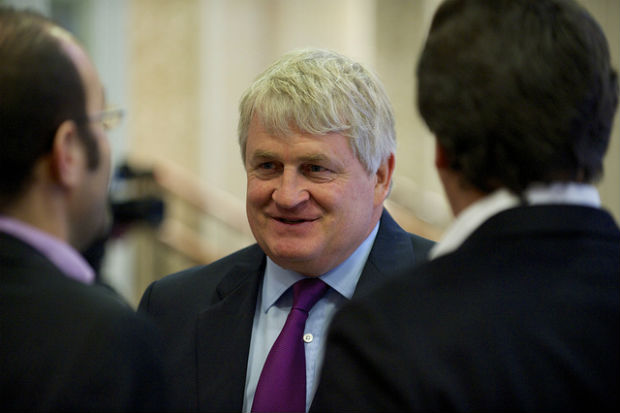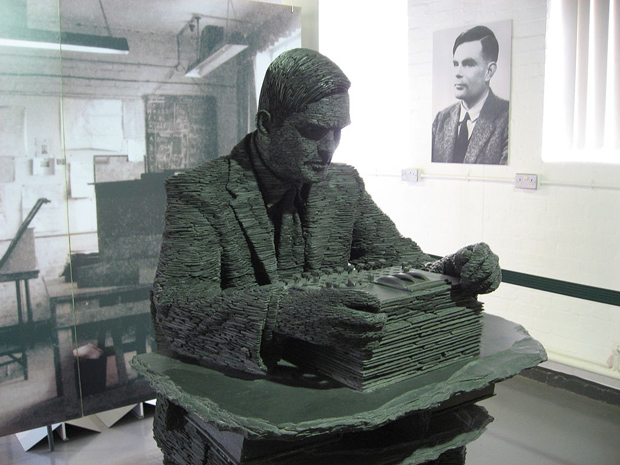10 Jun 15 | Azerbaijan, Azerbaijan News, Europe and Central Asia, mobile, News and features

From top left: Arif Yunus, Rasul Jafarov, Leyla Yunus, Khadija Ismayilova, Intigam Aliyev and Anar Mammadli – some of the government critics jailed on trumped up charges in Azerbaijan
On the eve of the inaugural European Games, taking place in Baku, Azerbaijan, activists from Amnesty International and Platform have been banned from entering the country. Both organisations have been highly critical of President Ilham Aliyev’s government, and its continuing targeting, jailing and prosecution of activists and journalists. Amnesty was set to present its findings on the state of human rights in Azerbaijan at an event in the capital on 10 June.
Emma Hughes of London-based NGO Platform was travelling to Baku on Tuesday afternoon with a press accreditation. After landing she was taken off the plane by security for questioning, where she was told she was on a “red list”. Her passport was taken away and she was held overnight at the airport before being deported. CCTV images of Hughes in detention surfaced in Azerbaijani media on Tuesday.
Platform has been campaigning against British oil company BP’s involvement in the oil rich former Soviet state. Platform’s new book — All that Glitters — Sport, BP and Repression — written by Hughes, will be released on 12 June, the opening day of the games.
“I’m being detained on the orders of the BP-Aliyev regime. I may get deported, but over 100 political prisoners in Azerbaijan face years in jail until the oil-funded regime falls. Civil society has been stamped on hard in Baku. Journalists, lawyers, academics, writers and activists have all found themselves behind bars. And yet the Oil Games carry on regardless. The future of this country is imprisoned, yet BP still work hand in hand with this regime,” Hughes said from Baku airport before her deportation.
Amnesty was set to present findings from a research trip they undertook in March at the briefing Azerbaijan: the Repression Games, with four staff members preparing to travel to Baku on the morning of 10 June. Amnesty was informed on Tuesday 9 June, via the Azerbaijani embassy in London, that “Azerbaijan is not in a position to welcome the Amnesty mission to Baku at the present time”, and suggested to postpone the trip until after the games.
Naomi Westland, who works on issues around sports and human rights at Amnesty, was one of the staff members hoping to present in Baku. Speaking from Tiblisi, Georgia, she said everything from visas and plane tickets; to venues, speakers and guests for the briefing had been arranged before the last-minute government U-turn.
“Amnesty being barred proves all the criticism levelled at Azerbaijan has been absolutely right. There has been an intense crackdown on human rights ahead of the European Games. This proves the Azerbaijani authorities want to create a criticism free zone while the world’s media is in attendance. The games are a massive PR exercise to present Azerbaijan as a modern, dynamic, progressive state. Behind the scenes, the reverse is the case. Amnesty has become victims of the repression meted out in Azerbaijan,” Westland told Index.
The banning of Platform and Amnesty comes after a Human Rights Watch researcher, Giorgi Gogia, was denied entry and detained in March at Baku airport for 30 hours, before being deported.
The human rights situation in Azerbaijan has deteriorated in the months leading up to the games. Since last summer, the country’s most prominent critical voices — including investigative journalist Khadija Ismayilova, human rights activists Leyla and Arif Yunus, human rights lawyer Intigam Aliyev and pro-democracy campaigner Rasul Jafarov — have been jailed on charges widely dismissed as trumped up and politically motivated. Critics believe the government of President Ilham Aliyev is using the games as and international image laundering exercise.
Politicians, high-level Olympic officials and athletes have in recent weeks faced mounting pressure to use the games to take a stand on the crackdown. The campaigning group Sports for Rights — initiated by Jafarov before his arrest — has called on European leaders to make their attendance of the games conditioned on the release of political prisoners, while Lord Coe, chairman of the British Olympic Association, has been urged to use the games to show support for fundamental rights and freedoms in Azerbaijan. Council of Europe’s human rights commissioner Nils Muižnieks has encouraged games participants to user their platforms to speak out about human rights situation.
In Depth
• Azerbaijan: Silencing human rights
This article was posted on 10 June 2015 at indexoncensorship.org
10 Jun 15 | Events
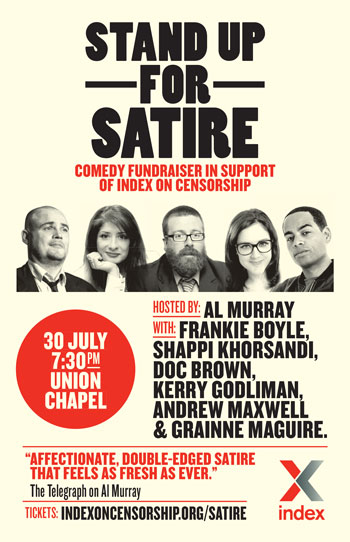
Join stand-up star Al Murray the Pub Landlord and outspoken friends for a top night of comedy in support of international freedom of expression charity Index on Censorship.
With a stellar line-up including the “foully inventive” Frankie Boyle, “razor sharp” Shappi Khorsandi, “truly inspired” Doc Brown, “smart and very funny” Kerry Godliman, “unpredictable” Andrew Maxwell and “delightfully quirky” Grainne Maguire.
Index on Censorship has long championed comedians, cartoonists and others facing threats of persecution, violence and even death. Index provides a platform for the censored to be read, seen and heard – promoting and defending the right to free speech globally. All proceeds from the event will go to support this work.
Satire is a powerful weapon that must be used wisely as anyone who wrote jokes about David Cameron for the last five years can attest. It’s great to be able to help Index do their bit in keeping freedom of expression alive in the UK.” – Al Murray
WHERE: Union Chapel, Compton Terrace, Islington, N1 2UN (Map)
WHEN: 30 July 7:30pm (Doors 6:30pm)
TICKETS: £40 VIP*, £20 general, £15 concessions – limited availability book now
*includes premium seating and exclusive drinks reception with VIP guests
Tickets are now sold out
Affectionate, double-edged satire that feels as fresh as ever.”
The Telegraph on Al Murray
black-hearted brilliance… the chance to see him at close quarters is not to be missed.”
The Guardian on Frankie Boyle
Don’t be fooled by her innocent looks, she packs a deceptively powerful punch.”
Evening Standard on Shappi Khorsandi
Sharp punch lines, imaginative devices and knows more than a thing or two about timing.”
Metro on Doc Brown
Goes for the jugular, quick wit, frank and engaging.”
The Independent on Kerry Godliman
Infuriatingly excellent…he delivers a superb set.”
The Sunday Times on Andrew Maxwell
Highly promising, delightfully quirky – has a big future ahead of her.”
Time Out on Grainne Maguire
09 Jun 15 | Academic Freedom, Magazine, Volume 44.02 Summer 2015
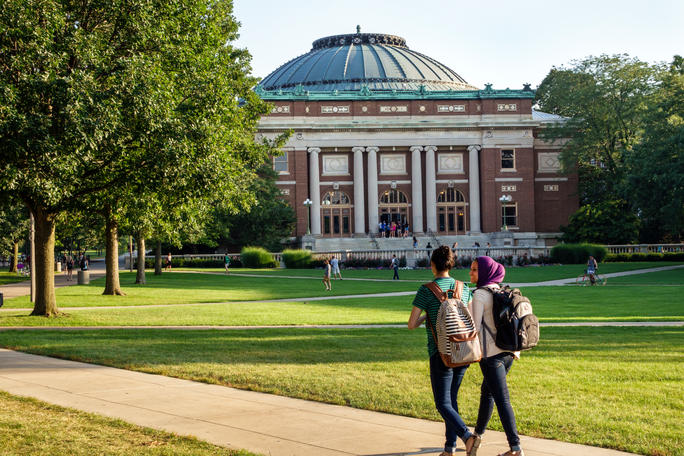
Illinois Urbana-Champaign University in the United States, where one academic had his job offer withdrawn over his tweets on the Israel-Gaza conflict. Credit: Alamy/ Jeff Greenberg
This article is taken from the summer issue of Index on Censorship magazine (volume 44, issue 2). To read the full report on academic freedom, subscribe or download the app on a free trial
The power of Arthur Miller’s play The Crucible continues to resonate in 2015. London’s Old Vic revived the play by Miller, a long-time supporter of Index, this year, and it has never seemed more chilling. As characters threw accusation and counter accusation at each other across the stage, the words felt just as relevant to the zip of the social-media age as to Salem in 1692.
In Ukraine, as our report in this issue details, attestation committees have now been set up to examine accusations by students and others that university academics might have “separatist attitudes” or have been using “provocative” speech. If found guilty lecturers can lose their jobs. This forms part of the brooding atmosphere currently hanging over Ukraine’s academic life, where former colleagues are banned from speaking to each other, and a system of national “patriotic” education has been introduced.
But Ukraine is not alone. In Belarus, a national committee acts casts a judgemental eye on any university that shows independence of spirit, or might choose to teach subjects in a way that the authoritarian government might find unsettling. And in Turkey, the nationwide YÖK committee stands disapprovingly on the sidelines, interfering in the minutiae of academic dress sense, giving orders about the wearing of headscarves and beards, as well as recently issuing a rule that academics should not give their opinions to the media, except on scientific subjects.
Around Turkey academic freedom is coming under attack from all sides, one lecturer who put a question about a Kurdish manifesto written in the 1970s on an exam paper, received multiple death threats and was accused of being “a terrorist”.
One hundred years ago the Declaration of Principles on Academic Freedom and Academic Tenure was published in the USA, a century on, university faculty are still finding that institutions disapprove of them having public opinions on political issues. While some US universities restrict freedom of expression on campuses to painted-square zones, presumably where students can cope with hearing opinions they disagree with, faculty members are expected not to be outspoken on social media, or find themselves, as in the case of Steven Salaita (detailed in the magazine), having their assistant professorship job offer withdrawn.
Universities should be places where discoveries are made. Academia is an opportunity for students and teachers to challenge themselves; their preconceptions and values, and, perhaps, head off in a new direction. Studying can be the start of something big; a new idea that might end in an enormously valuable invention such as the Large Hadron Collider; or it might just be a big moment for the individual, who discovers a fascination for medieval history, or 8th-century literature.
Education opens up all sorts of avenues of discovery, but if we start closing some of those roads off, arguing they are too dangerous, or challenging, or hold possible stress, then we are heading off in a terrifying direction. For this issue of the magazine, we found academics, authors and activists around the world were worried enough to support the following statement:
“We the undersigned believe that academic freedom is under threat across the world from Turkey to China to the USA. In Mexico academics face death threats, in Turkey they are being threatened for teaching areas of research that the government doesn’t agree with. We feel strongly that the freedom to study, research and debate issues from different perspectives is vital to growing the world’s knowledge and to our better understanding. Throughout history, the world’s universities have been places where people push the boundaries of knowledge, find out more, and make new discoveries. Without the freedom to study, research and teach, the world would be a poorer place. Not only would fewer discoveries be made, but we will lose understanding of our history, and our modern world. Academic freedom needs to be defended from government, commercial and religious pressure.”
A full list of signatures can be seen here, with supporters including authors AC Grayling, Monica Ali, Kamila Shamsie and Julian Baggini; Jim Al-Khalili (University of Surrey), Sarah Churchwell (University of East Anglia), Thomas Docherty (University of Warwick), Michael Foley (Dublin Institute of Technology), Richard Sambrook (Cardiff University), Alan M. Dershowitz (Harvard Law School), Donald Downs (University of Wisconsin-Madison), Professor Glenn Reynolds (University of Tennessee), Adam Habib (vice chancellor, University of the Witwatersrand), Max Price (vice chancellor, University of Cape Town), Jean-Paul Marthoz (Université Catholique de Louvain), Esra Arsan (Istanbul Bilgi University) and Rossana Reguillo (ITESO University, Mexico).
The range of signatures from countries around the globe show just how far and wide the fear is that academic freedom is, in 2015, coming under enormous pressure.
© Rachael Jolley
This article comes from the summer issue of Index on Censorship magazine (volume 44, issue 2), which contains features from across the world, plus fiction and poetry by writers in exile. Subscribe or download the app (free trial) to read the magazine in full. For reproduction rights, please contact Index on Censorship directly, via vicky@indexoncensorship.org
Students and academics at 7500 universities around the globe have access to the magazine’s archive containing 43 years of articles via Sage.
Subscribers can read Arthur Miller in Index on Censorship magazine here.
09 Jun 15 | Academic Freedom, Magazine, Volume 44.02 Summer 2015
[vc_row][vc_column][vc_custom_heading text=”What is the state of academic freedom in 2015? Index on Censorship magazine’s summer 2015 issue takes a global vantage point to explore all the current threats – governmental, economic and social – faced by students, teachers and academics. “][vc_row_inner][vc_column_inner width=”1/2”][vc_column_text]
In the UK and US, offence and extremism are being used to shut down debates, prompting the adoption of “no-platforming” and “trigger-warnings”. In Turkey, an exam question relating to the Kurdish movement led to death threats for one historian. In Ireland, there are concerns over the restraints of corporate-sponsored research. In Mexico, students are being abducted and protests quashed.
[/vc_column_text][/vc_column_inner][vc_column_inner width=”1/2″][vc_single_image image=”66714″ img_size=”full”][/vc_column_inner][/vc_row_inner][vc_column_text]
Plus we have reports on Ukraine, China and Belarus, on how education is expected to toe an official line. Also in this issue: Sir Harold Evans, AC Grayling, Tom Holland and Xinran present their free-speech heroes. Ken Saro-Wiwa Junior introduces a previously unpublished letter from his activist father, 20 years after he was executed by the Nigerian state, and Raymond Joseph reports on the dangers faced by Africa’s environmental journalists today. Comedian Samm Farai Monro, aka Comrade Fatso, looks at the rise of Zimbabwean satire; Matthew Parris interviews former UK attorney general Dominic Grieve; Italian journalist Cristina Marconi speaks to Marina Litvinienko, wife of the murdered KGB agent Alexander; and Konstanty Gebert looks at why the Polish Catholic church is upset by Winnie the Pooh and his non-specific gender.
Our culture section presents exclusive new short stories by exiled writers Hamid Ismailov (Uzbekistan) and Ak Welaspar (Turkmenistan), and poetry by Musa Okwonga and Angolan journalist Rafael Marques de Morais. Plus there’s artwork from Martin Rowson, Bangladeshi cartoonist Tanmoy and Eva Bee, and a cover by Ben Jennings.
[/vc_column_text][/vc_column][/vc_row][vc_row][vc_column][vc_custom_heading text=”SPECIAL REPORT: FIRED, THREATENED AND IMPRISONED” css=”.vc_custom_1483456198790{margin-right: 0px !important;margin-left: 0px !important;border-bottom-width: 1px !important;padding-top: 15px !important;padding-bottom: 15px !important;border-bottom-color: #455560 !important;border-bottom-style: solid !important;}”][vc_column_text]
Is academic freedom being eroded?
Silence on campus – Kaya Genç explores why a Turkish historian received death threats for writing an exam question
Universities under fire in Ukraine’s war – Tatyana Malyarenko unveils how Ukrainian scholars have to prove their patriotism in front of a special committee
Industrious academics – Michael Foley looks at how the commercial pressures on Ireland’s universities and students is narrowing research
Stifling freedom – Mark Frary’s take on 1oo years of attacks on US academic freedom
Ideas under review – Lawyer and journalist Suhrith Parthasarathy looks at how the Indian government interfering with universities’ autonomy. Also Meena Vari asks if India’s most creative artistic minds are being stifled
Girls standing up for education – Three young women from Pakistan, Uganda and Nigeria on why they are fighting for equality in classrooms
Open-door policy – Professor Thomas Docherty examines the threats to free speech in UK universities. Plus the student’s view, via the editor of Cambridge’s The Tab new site
Mexican stand-off – After the abduction of 43 students, Guadalajara-based journalist Duncan Tucker looks at the aftermath and the wider picture
Return of the red guards – Jemimah Steinfeld reports on the risks faced by students and teachers who criticise the government in China
[/vc_column_text][/vc_column][/vc_row][vc_row][vc_column][vc_custom_heading text=”IN FOCUS” css=”.vc_custom_1481731813613{margin-right: 0px !important;margin-left: 0px !important;border-bottom-width: 1px !important;padding-top: 15px !important;padding-bottom: 15px !important;border-bottom-color: #455560 !important;border-bottom-style: solid !important;}”][vc_column_text]
Pride and principles – Matthew Parris in conversation with the former UK attorney general Dominic Grieve
A letter from Ken Saro-Wiwa – A moving tribute from the son of one of the Ogoni nine and a previously unpublished letter from his father who was killed in Nigeria 20 years ago
Hunt and trap – Raymond Joseph reports on the dangers currently being faced by Africa’s environmental journalists
Litvinienko’s legacy – Italian journalist Cristina Marconi speaks to Marina Litvinienko, wife of the murdered KGB agent Alexander
God complex – Konstanty Gebert looks at why the Polish Catholic church is so worried about Winnie the Pooh’s gender
Zuma calls media ‘unpatriotic’ – Professor Anton Harber speaks to Natasha Joseph about the increasing political pressure on South African journalism
Dangers of blogging in Bangladesh – Vicky Baker on the recent murders of Bangladeshi bloggers by fundamentalists, plus a cartoon by Dhaka Tribune’s Tanmoy
Comedy of terrors – Samm Farai Monro, aka Comrade Fatso, on the power of Zimbabwe’s comedians to take on longstanding political taboos
Print under pressure – Miriam Mannak reports on the difficulties facing the media in Botswana, as the president tightens his grip on power
On forgotten free speech heroes – Sir Harold Evans, AC Grayling, Tom Holland and Xinran each pick an individual who has made a telling contribution to free speech today
Head to head – Lawyer Emily Grannis debates with Michael Halpern on whether academic’s emails should be in the public domain
[/vc_column_text][/vc_column][/vc_row][vc_row][vc_column][vc_custom_heading text=”CULTURE” css=”.vc_custom_1481731777861{margin-right: 0px !important;margin-left: 0px !important;border-bottom-width: 1px !important;padding-top: 15px !important;padding-bottom: 15px !important;border-bottom-color: #455560 !important;border-bottom-style: solid !important;}”][vc_column_text]
The pain of exile – Exclusive new fiction from Uzbek writer Hamid Ismailov, who has not only had all his books banned back in his homeland, but every mention of his name
Eye of the storm – A poem by Musa Okwonga on the importance of allowing offensive views to be heard and debated on university campuses
The butterfly effect – The lesser known poetry of Index award-winner Rafael Marques De Morais
Listening to a beating heart – A new short story from Ak Welsapar, an author forced to flee his native Turkmenistan after being declared an enemy of the people
[/vc_column_text][/vc_column][/vc_row][vc_row][vc_column][vc_custom_heading text=”COLUMNS” css=”.vc_custom_1481732124093{margin-right: 0px !important;margin-left: 0px !important;border-bottom-width: 1px !important;padding-top: 15px !important;padding-bottom: 15px !important;border-bottom-color: #455560 !important;border-bottom-style: solid !important;}”][vc_column_text]
Global view – Index’s CEO Jodie Ginsberg on the difficulties of measuring silenced voices
Index around the world – An update on Index’s latest work
[/vc_column_text][/vc_column][/vc_row][vc_row][vc_column][vc_custom_heading text=”END NOTE” css=”.vc_custom_1481880278935{margin-right: 0px !important;margin-left: 0px !important;border-bottom-width: 1px !important;padding-top: 15px !important;padding-bottom: 15px !important;border-bottom-color: #455560 !important;border-bottom-style: solid !important;}”][vc_column_text]
Battle of the bots – Vicky Baker reports on the fake social media accounts trying to silence online protest
[/vc_column_text][/vc_column][/vc_row][vc_row][vc_column][vc_custom_heading text=”SUBSCRIBE” css=”.vc_custom_1481736449684{margin-right: 0px !important;margin-left: 0px !important;border-bottom-width: 1px !important;padding-bottom: 15px !important;border-bottom-color: #455560 !important;border-bottom-style: solid !important;}”][vc_column_text]Index on Censorship magazine was started in 1972 and remains the only global magazine dedicated to free expression. Past contributors include Samuel Beckett, Gabriel García Marquéz, Nadine Gordimer, Arthur Miller, Salman Rushdie, Margaret Atwood, and many more.[/vc_column_text][vc_row_inner][vc_column_inner width=”1/2″][vc_single_image image=”76572″ img_size=”full”][/vc_column_inner][vc_column_inner width=”1/2″][vc_column_text]In print or online. Order a print edition here or take out a digital subscription via Exact Editions.
Copies are also available at the BFI, the Serpentine Gallery, MagCulture, (London), News from Nowhere (Liverpool), Home (Manchester), Calton Books (Glasgow) and on Amazon. Each magazine sale helps Index on Censorship continue its fight for free expression worldwide.
 SUBSCRIBE NOW[/vc_column_text][/vc_column_inner][/vc_row_inner][/vc_column][/vc_row]
SUBSCRIBE NOW[/vc_column_text][/vc_column_inner][/vc_row_inner][/vc_column][/vc_row]
09 Jun 15 | Azerbaijan, Azerbaijan News, Europe and Central Asia, mobile, News and features
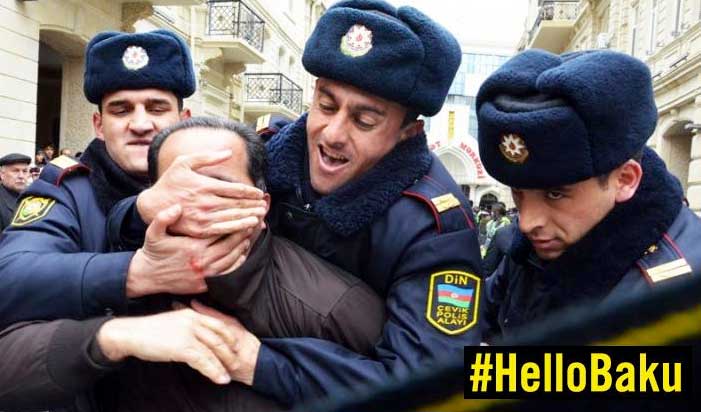
Human rights groups hijacked a hashtag used to promote a contest to win tickets to the opening ceremony of the Baku European Games (Photo: Amnesty International)
President Ilham Aliyev of Azerbaijan has high hopes for the European Games; the brand new, European Olympic Committee-backed regional sporting event which kicks off Friday 12 June in Baku. According to the organising committee BEGOC, Baku 2015 — with an estimated price tag of some £5.4 billion — will “showcase Azerbaijan as a vibrant and modern European nation of great achievement”. But it seems the event is not down to Azerbaijani achievements alone: from promotions to operations, foreign manpower has played a significant role in making Baku 2015 a reality.
Brit Simon Clegg, former chief executive of the British Olympic Association and Ipswich Town football club, is the CEO of the games. He took over when American Jim Scherr, who has previously overseen US Olympic teams, stepped down in 2014. Dimitris Papaioannou, the Greek artistic director of the opening ceremony of the 2004 Athens Olympics, will reprise this role in Baku. Meanwhile, British marketing firm 1000heads was behind a social media competition to give away tickets to the show. James Hadley, Cirque du Soleil’s senior artistic director, will take the reins of the closing ceremony, with the help of creative director Libby Hyland, who previously worked on the Pan American Games. The promo video was directed by American Joel Peissig, signed to the production company of Oscar-nominated filmmaker Ridley Scott. UK/US-based major events company Broadstone is taking care of day-to-day business on the ground, from transport, to human resources, to security. And the list goes on.
Sporting stars have also made their mark even before the start of the games. “Baku 2015” has for months been emblazoned on the shirts of Spanish football giants Atletico Madrid. A number of participants — from British taekwondo athlete Jade Jones, to French rhythmic gymnast Kseniya Moustafaeva, to Serbia’s 3×3 basketball team of Dušan Domović Bulut, Marko Savic, Marko Zdero and Dejan Majstorovic — have been named international athlete ambassadors.
While most contemporary mega sporting events are, to an extent, multinational operations, the situation in Azerbaijan follows a familiar pattern. The oil rich country — ruled by President Aliyev since 2003, when he took over from his father Heydar — has for some time relied on foreign input in its ongoing international rebranding project. Meanwhile, the government has been cracking down on human rights at home.
Take for instance the modernisation and beautification of downtown Baku. The flame towers dominating the skyline were designed by global architecture firm HOK. The in-demand London-based design studio Blue Sky Hospitality has worked on over a dozen restaurants in the city over the past five years. This includes at least five in Port Baku, dubbed the city’s “premier luxury address” by the glossy, internationally distributed magazine edited by the president’s daughter Leyla Aliyeva. Azerbaijan has also worked with foreign public relations companies, such as the Berlin-based Consultum Communications and global firm APCO, with headquarters in Washington. The government even hired former British Prime Minister Tony Blair as an advisor in 2014. According to independent news site Contact.az, the government in 2011 allocated AZN 30,000,000 (£18.7 million) in the state budget to promoting Azerbaijan, though this figure is thought to be an underestimate.
But the push to paint Azerbaijan as a forward-looking state has not translated into progress on the human rights front. Over the past year alone, the country’s most prominent critical voices — including investigative journalist Khadija Ismayilova, human rights activists Leyla and Arif Yunus, human rights lawyer Intigam Aliyev and pro-democracy campaigner Rasul Jafarov — have been jailed on charges widely dismissed as trumped up and politically motivated.
Critics believe the government, with the help of overt foreign PR and the prestige of working with well-known international names, is presenting a sanitised version of Azerbaijan to the world, to whitewash its poor rights record. In other words: the government targets those challenging its representation of Azerbaijan, and the PR blitz in turn masks the crackdown. “We are facing a huge PR and propaganda machine from Azerbaijan supported by oil companies in the west,” Azerbaijani journalist Emin Milli said at an expert panel debate ahead of the games.
“The Aliyev government has used the revenues of the oil and gas fields to finance a stream of grandiose projects — from the Heydar Aliyev Airport, to the Heydar Aliyev Cultural Centre and the European Games. In the realisation of these projects it has hired a number of international corporations. British companies are particularly heavily involved, for example in constructing the airport, designing the centre, and co-ordinating and branding the games,” said James Marriott from the London-based NGO Platform.
Or, as Simon Clegg told The Independent in 2014, British companies “are absolutely at the forefront of winning contracts over here [Azerbaijan] for the successful delivery of the games”.
Platform’s campaigning is focused around BP, the British oil company which has long worked in Azerbaijan and is one of the lead sponsors of the games. “In binding itself so closely to these foreign corporations the Aliyev government is building the international political support that it recognises is so vital, especially as it tries to counter the growing dissent in Azerbaijan,” added Marriott.
Rebecca Vincent coordinates the Sport for Rights campaign, which has worked to raise awareness around the crackdown on government critics in the lead-up to the games. The movement was initiated by Rasul Jafarov before his arrest. Those wanting to raise human rights issues are “fighting this massive army of very well paid PR firms throughout Europe,” said Vincent.
“The Azerbaijani government’s PR has been quite effective. They have been successful in promoting Azerbaijan as this modern, glamorous country. We’re working very hard to show that there is more to the story; that there is a more sinister side,” she added.
According to Azerbaijani journalist Arzu Geybulla, reaction from her countrymen and women to their government’s strategy has been mixed, and dependent on how much information they have. Some are simply preoccupied with putting food on the table and are unaware of the extent of foreign involvement; others, often young and western-educated, know what’s going on, but are reluctant to challenge the status quo directly.
She categorises foreign companies and individuals working in Azerbaijan in a similar way. Some, she says, know nothing about Azerbaijan and are just there to take the opportunity given to them. Others have limited understanding of the state of human rights in the country, and “care very little about imprisoned journalists or beaten bloggers”. The final group, where she places the EOC, is fully aware of situation on the ground, “and yet they’re saying that athletes are coming there to compete, and the crackdown shouldn’t prevent a sports competition taking place”.
Index queried a number of individuals and firms associated with the games.
One person was willing to speak on the condition of anonymity. While stressing that the presence of international staff and companies is business as usual for large sporting events, the source dubbed the situation at the Baku Games “a little bit weird”, especially noting the “big British connection”.
The person said they didn’t know much about Azerbaijan or its political climate when taking on the job, but spoke of their shock upon arriving in the capital. “Baku is like Monaco crashing into Tijuana … it’s one giant set,” they said, dubbing it a city of facades. “It seemed pretty desperate.” Though the source said they would consider speaking out about the situation, they worried about the impact it might have on the locals they worked with.
1000heads, the London-based company behind #HelloBaku (a social media competition which was hijacked by activists to draw attention to human rights and free speech violations in Azerbaijan), told Index they are no longer involved in the games.
As for athlete ambassador Jade Jones, she says she is focusing purely on the sporting side: “We go to different places. Some places are better than others. I’m just going there to do my job and perform.”
Clegg, meanwhile, has stood firm when pressed on human rights concerns: “Look where they’ve come from – decades of Soviet rule and oppression,” he told The Guardian. “You don’t go from there to there overnight. If you do, you end up with chaos and civil disorder.”
This echoes the government narrative, which describes of a country that may not be perfect, but that is on the right track. “Azerbaijan, as a young democracy and dynamically developing country, which demonstrated goodwill in hosting the first Baku Games, deserves appreciation and understanding, too,” a foreign ministry spokesperson told the BBC.
But with the ongoing jailing and judicial harassment of vocal critics of the government being widely labelled an unprecedented crackdown, many disagree with this interpretation. Council of Europe human rights commissioner Nils Muižnieks co-wrote a recent op-ed arguing that human rights cannot be ignored during the games, and encouraging athletes going to Baku to use their platform to speak out. Some seem to have already taken him up on this: German athletes last week called for the release of Azerbaijan’s political prisoners. “Although I do not usually address directly private companies, I can say that I would like to see the business field taking into more consideration human rights related issues which may arise from its activities,” Muižnieks told Index.
On the day of the opening ceremony, Jafarov will be going back to court. With this, Rebecca Vincent says the government has the opportunity to send a message more powerful than the sure to be spectacular show taking place in Baku National Stadium. “I’d remind the Azerbaijani authorities that the best PR would be to stop the human rights crackdown and release the political prisoners,” she said.
“Rasul’s release would be a step in the right direction.”
This article was posted on 9 June 2015 at indexoncensorship.org
08 Jun 15 | mobile, Youth Board
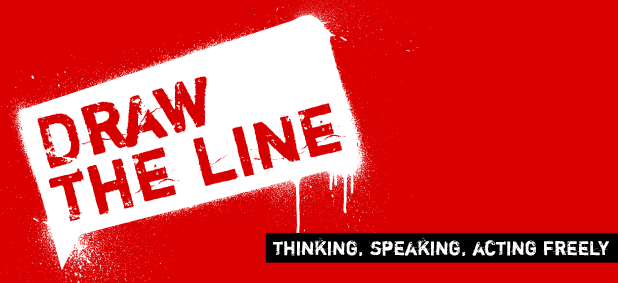
Over the past few months, the Index on Censorship Youth Advisory Board has been coming together to ask difficult, yet essential questions; attempting to spark and promote thought provoking debates and engage the general public in societal issues and conflicts that affect us all.
The topics we have explored in #IndexDrawTheLine can be found below. You can follow the links to see the youth board’s full coverage.
- Returning to the issue of extremism for our penultimate discussion, we looked at whether or not it has a place on campus, arguing that: “Universities should be places where young people have the freedom to learn, debate and use their knowledge to challenge guest speakers.”
But the conversation doesn’t stop there. We have to keep encouraging open debate and a level of transparency in a world full of censorship. It is imperative as new threats to free speech arise each day, and old threats recur. It is the responsibility of all of us to provide a voice for the voiceless, represented and unrepresented alike.
To join in future discussions, follow the #IndexDrawtheLine hashtag on Twitter.
This article was posted on 8 June 2015 at indexoncensorship.org
05 Jun 15 | Academic Freedom, Events, mobile, Volume 44.02 Summer 2015
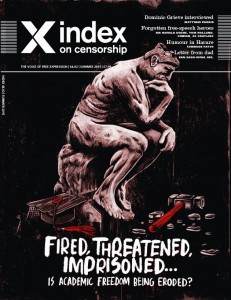
Education, the beginning of so many roads. But if we start closing some of those avenues down, arguing they are too dangerous or challenging, do we begin to travel in a terrifying direction?
From no-platform policies to campus extremism, and student sit-ins to the correct balance between safety and liberty, join us to explore the global situation for freedom of expression on campus.
Come to our lively Question Time-style discussion, chaired by Index on Censorship’s CEO Jodie Ginsberg and introduced by magazine editor Rachael Jolley.
With speakers including:
- Nicola Dandridge, chief executive, Universities UK
- Greg Lukianoff, president and chief executive, Foundation for Individual Rights in Education, USA
- Lord Ken Macdonald, barrister, former director of public prosecution, and warden, Wadham College, Oxford
- Julie Bindel, journalist, broadcaster, author and feminist campaigner
- Siana Bangura, blogger, writer, spoken word poet
Followed by a summer drinks reception.
When: Wednesday 1 July, 6:30-7:30pm event, followed by drinks reception
Where: Clore Centre, Birkbeck College, University of London, WC1E 7HX (Map/directions)
Tickets: Free, registration is required as space is limited.
Presented in conjunction with The Conversation, SAGE Publishing and Arts Council England.

05 Jun 15 | mobile, Youth Board

In the latest #IndexDrawtheLine, we’ve been asking the question: where should governments draw the line on everyday surveillance?
Mass surveillance has been a controversial issue, notably since former contractor for the US National Security Agency (NSA) Edward Snowden leaked information about the agency’s domestic spying. Today, some governments worldwide monitor phone calls, text messages and/or social media communications within the countries. Granted, mass surveillance may well be beneficial for governments to fight terrorism and ensure national security, but some people are concerned about the invasion of their privacy and personal life.
As well as the debate about this question on Twitter, we asked some students based around the world to give us their views. The students and their respective views can be seen in the form of photographs below.
One user on Twitter argued that the line should be drawn as per the law and added, “This right of OURS ‘…shall not be violated and no warrants shall issue but upon probable cause'” referring to the fourth amendment to the United States constitution.
Other responses suggested that governments should be able to ensure national security without invading the privacy of the people. One of the students below argues that the line should be drawn so that “my mother knows more about me than BIG BROTHER”, referring to the leader of the fictitious state from George Orwell’s novel Nineteen Eighty-Four.
The general consensus seems to be that government surveillance should not happen unless it is proved there is a genuine threat to the safety and security of the people.
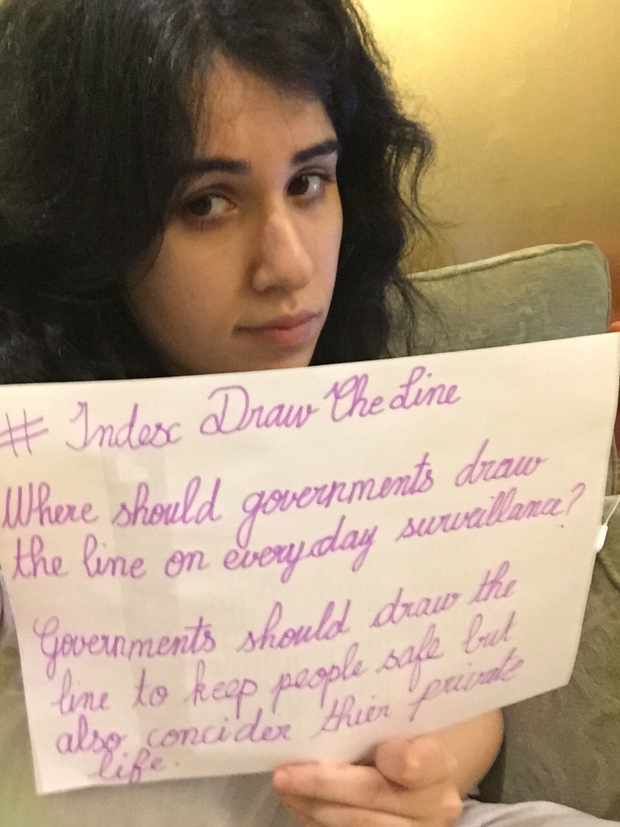
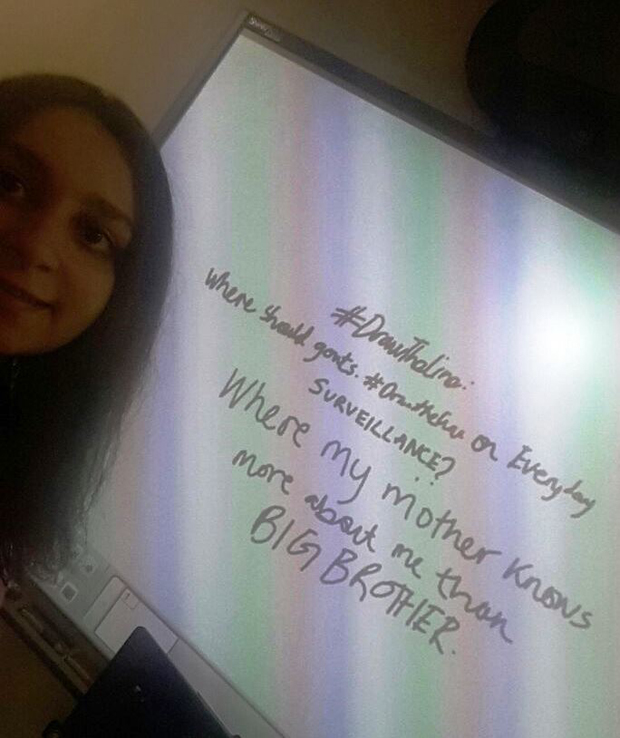
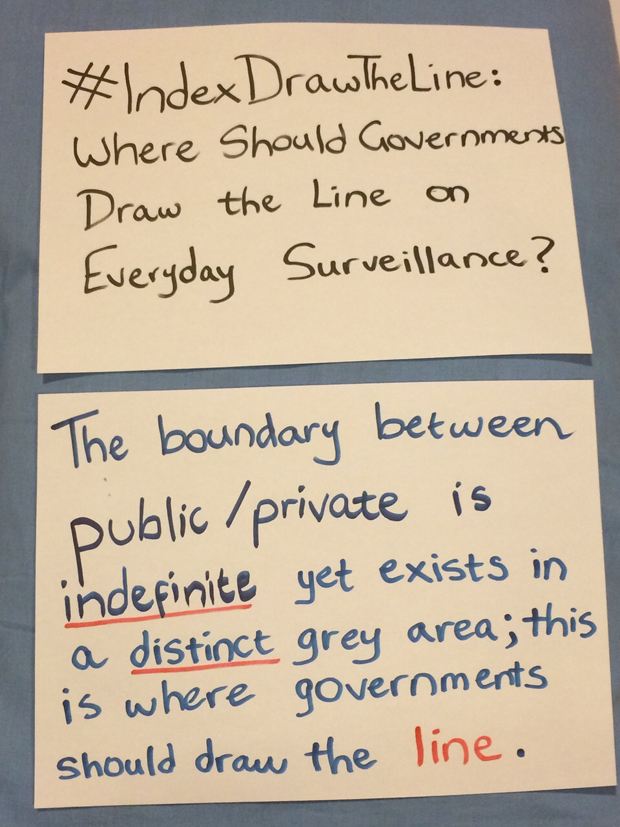
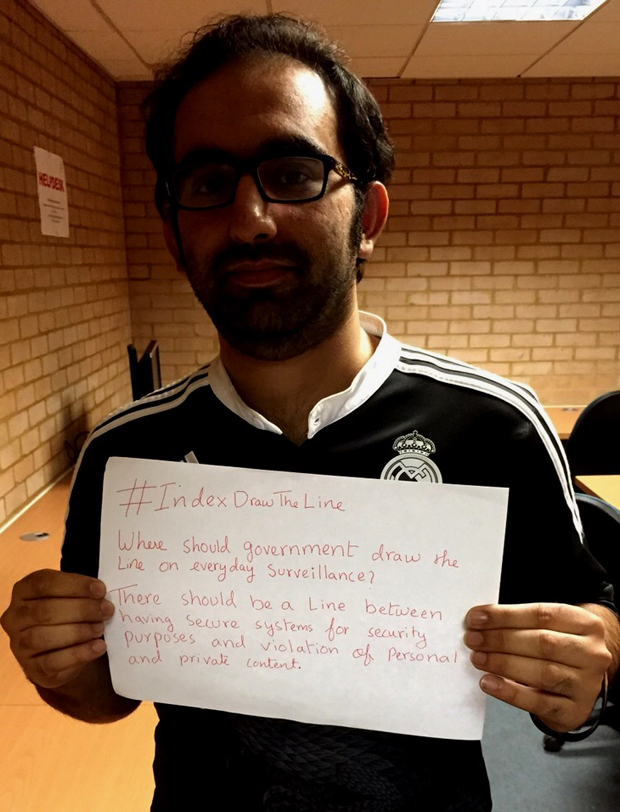
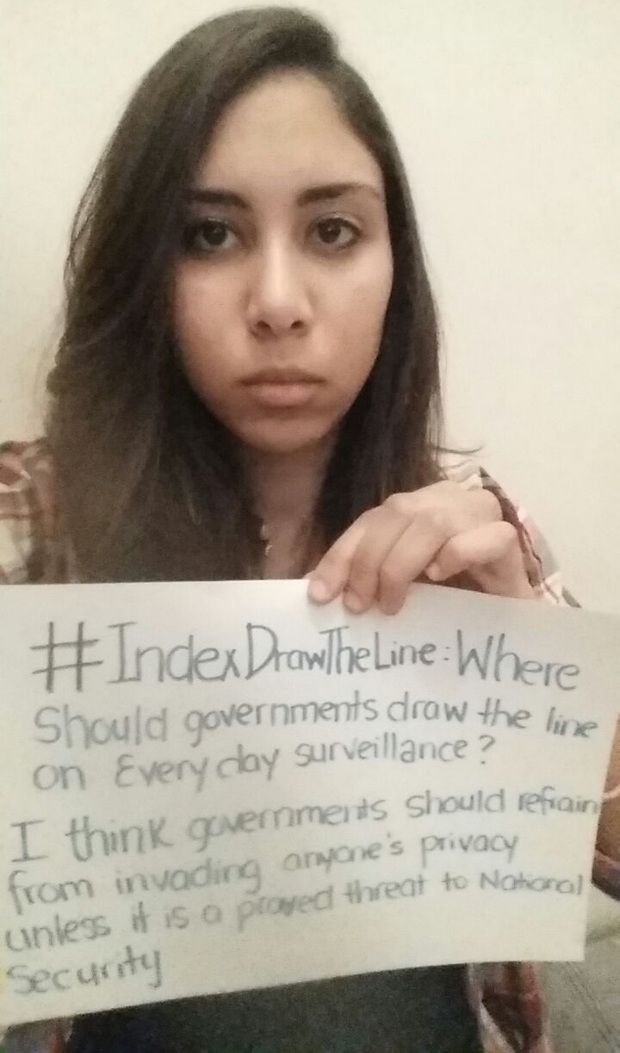
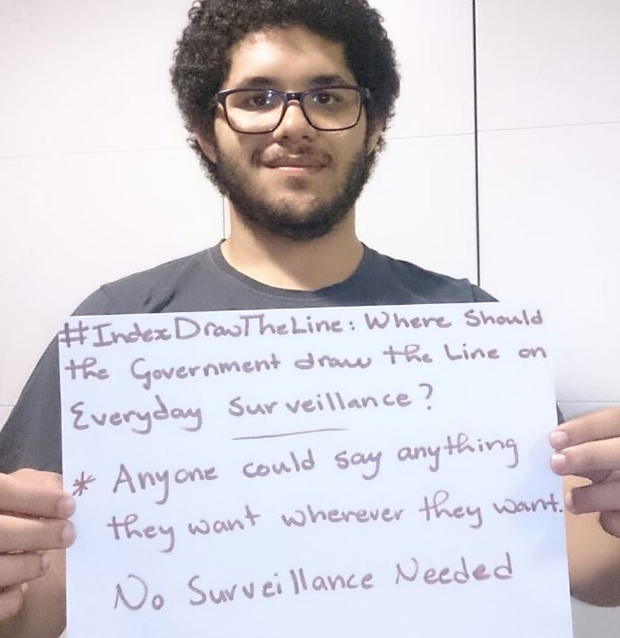
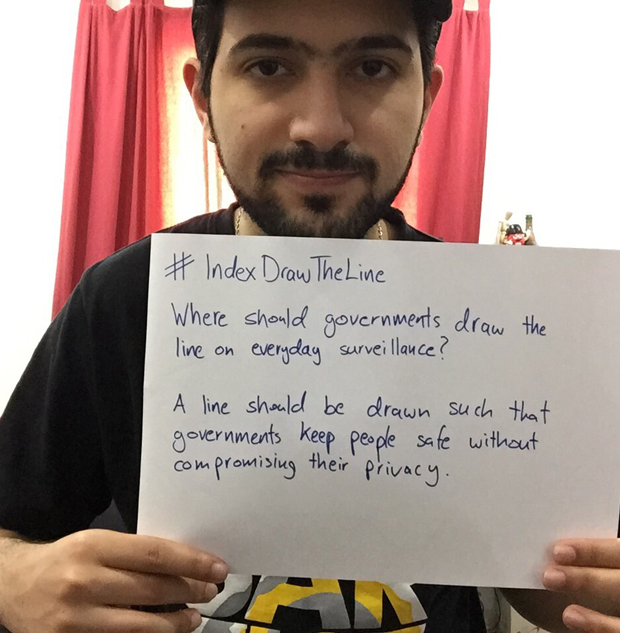
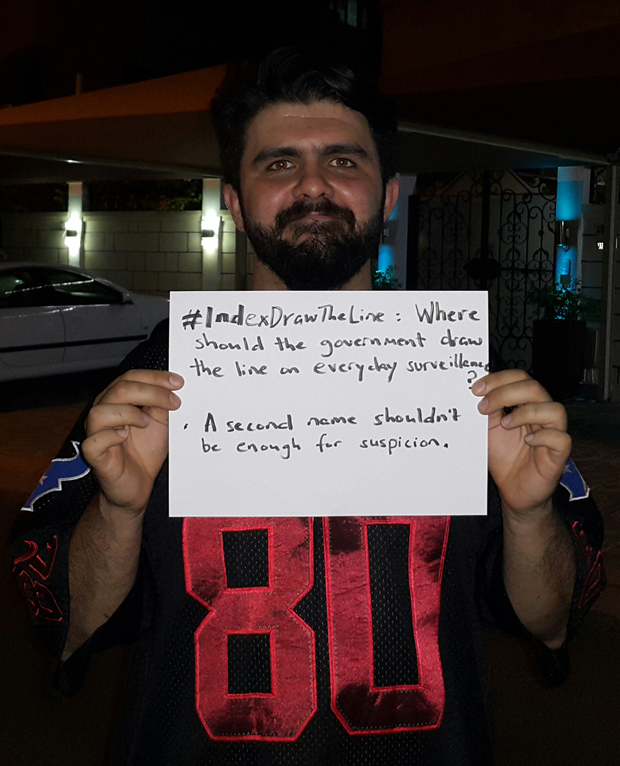
This article was posted on 6 June 2015 at indexoncensorship.org
04 Jun 15 | Campaigns, Counter Terrorism, mobile, Statements
Index on Censorship considers Tony Blair’s proposals on hate speech to be dangerous and divisive. Blair, who is to be appointed chair of the European Council on Tolerance and Reconciliation (ECTR) has defended plans to lower the the barriers on what constitutes incitement to violence and make Holocaust denial illegal.
“These suggestions — far from protecting people — are likely to have the opposite effect, driving extremist views underground where they can fester and grow,” said Jodie Ginsberg, CEO of Index on Censorship. “Instead, we should be protecting free expression, including speech that may be considered offensive or hateful, in order to expose and challenge those views.”
Individuals should always be protected from incitement to violence and that protection already exists in law, as do stringent laws on hate speech. Further legislation is not needed.
04 Jun 15 | Events
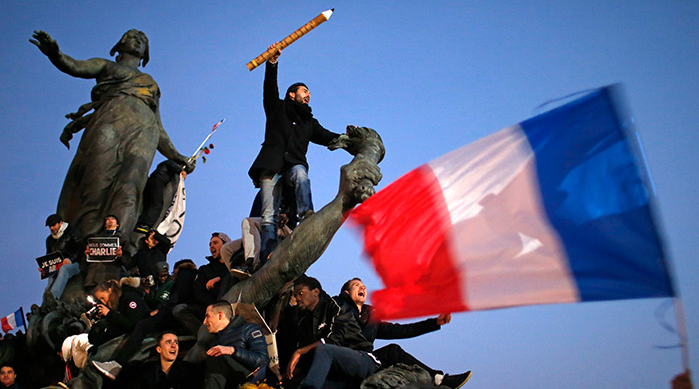
Photo: Thomson Reuters Foundation
Six months after the Charlie Hebdo attacks in Paris, journalists face more threats than ever before, from harassment to imprisonment to murder – since the beginning of the year, 50 journalists have been killed.
While some countries, like Norway, have scrapped blasphemy laws to strongly assert freedom of speech, others such as the UK are increasing state surveillance and censorship to “protect citizens from violence”. How can international law protect journalists in this challenging and unique context? Is it possible to strike a balance between security concerns and freedom of expression? Is the right to free speech an absolute one?
Join the Thomson Reuters Foundation, Reporters Without Borders and Paul Hastings LLP for a panel debate featuring:
- John Lloyd, Reuters Institute and Financial Times
- Prof Timothy Garton Ash, Oxford University
- Sylvie Kauffmann, Le Monde
- William Bourdon, Paris Bar and Association Sherpa
- Jodie Ginsberg, Index on Censorship
When: Monday 29 June, 6:00pm (followed by drinks reception & canapés)
Where: Edelman, London, SW1E 6QT (Map/directions)
Tickets: Free, book here
#FreeSpeechDebate
04 Jun 15 | Europe and Central Asia, Ireland, mobile, News and features
“Where would we be in Ireland if four million people had to make public all their banking relationships?” tycoon Denis O’Brien asked in an Irish Times opinion piece last week. It is a more interesting question than I suspect O’Brien meant it to be. The Irish economy suffered heavily from the nods, winks, strokes carried on behind closed doors throughout the 90s and 2000s, and perhaps a little more transparency, a touch more daylight shed on banking matters, would have been for the good.
O’Brien, owner of a large central plain of Ireland’s media landscape, was writing for one of the newspapers he didn’t own amidst a controversy surrounding his own private banking relationships, specifically his relationship with the state-owned Irish Bank Resolution Corporation (IBRC).
Independent TD Catherine Murphy had made allegations in the parliamentary chamber regarding the interest rate Mr O’Brien had been given on a €500m loan from IBRC. The loan related to the purchase of Siteserv, a major recycling firm.
O’Brien, on learning about Murphy’s remarks, apparently while breakfasting in Haiti, was incensed by what he saw as a blatant breach of privacy, and immediately instructed his lawyers to seek an injunction on the reporting of the Dáil speech, which they duly won. “It was one of those nanosecond decisions,” O’Brien wrote, in an article brimming with indignation. Those who criticised the injunction were engaged in nothing less that a witch hunt: “I have never experienced the level of abuse, venom and hatred resulting from taking a stand to protect privacy in relation to my financial affairs.” He then signed off, oddly: “I will always be proud to be Irish, optimistic and a republican with a small ‘r’.” Good to know, Denis.
Actually, that last statement is worth looking at: in spite of it all, in spite of all the slings and arrows, in spite of the insufferability of this stupid, petty, greasy-till fumbling little country, O’Brien will not abandon Ireland. He is proud, he is optimistic, he is a republican, but not too republican. We are lucky to have him.
This language was echoed by his spokesman James Morrissey, who told RTE’s Keelin Shanley that, frankly we were lucky to have O’Brien. “I think it’s important to mention, and it would be a celebratory fact if it was an IDA-backed [state-assisted] company, but Denis O’Brien employs in and around 10,000 people both directly and indirectly in this country and he’s entitled to invest and he’s entitled to have his leading bid for a company accepted.”
In Ireland, you see, wealth and employment are articles of faith, and they should not be questioned lest they melt into air.
I am not even going to attempt to get into the exact details of O’Brien’s finances. The injunction on reporting was “clarified” earlier this week, and as a result, you can now read articles such as this one on The Journal, which was removed after the injunction was initially granted, reporting on Murphy’s speech.
No, these are not the business pages and others will report on the ins and outs better than I. What concerns us here are two factors: parliamentary privilege, and the public interest.
First of all, parliamentary privilege: that is, the right to speak without hindrance in parliament, and the right for the press to report what is said in parliament.
While O’Brien’s spokesman Morrissey may have dismissed the Dáil as a “talking club”, it’s absolutely crucial to a democracy that elected representatives can make their representations fearlessly. Lord knows it doesn’t happen enough, but we should be encouraging it.
Almost six years ago in Britain, in an important moment for the free press, democracy and justice, The Guardian took on metals and energy company Trafigura when it attempted to stifle reporting of an internal document on a waste spill. On that occasion, Carter-Ruck attempted to stop the papers from reporting a parliamentary question from Paul Farrelly MP on the issue. Trafigura and its lawyers backed down on their injunction just hours before The Guardian was due to appeal. It was an important moment, not just in upholding the principle of parliamentary privilege, but also in proving its worth (it should be noted that some idiotic things can also be done under the mantle of parliamentary privilege, but the good rather outweighs the bad).
Returning to present-day Ireland, here’s the transcript where O’Brien’s spokesman called the nation’s parliament a “talking club”:
Shanley: [W]hat relevance is it how many people [O’ Brien] employs in this country? I mean we’re talking here about press freedom. We’re talking about somebody with huge power, who owns half of the media and is preventing the other half from reporting…”
Morrissey: “No I think you’re missing my point. I was just saying when [opposition parliamentarian] Billy Kelleher talks about powerful people. A powerful person has the same rights as a person who’s not powerful and that is a democratic right to their good name and reputation and not to have it sullied in the Dáil. And I think, to be brutally blunt about it, the Dáil is a bit of a talking club. They want their own rules for themselves and I think, to be fair, it’s important that people stand up for democracy inside the Dáil, as well as outside the Dáil because that’s the basis on which they get elected.”
Note here that democracy is whatever you want it to be at that particular time: and the things you do not want can be undemocratic. Note the spokesman for the nation’s wealthiest person making an appeal to the common man against the political class. O’Brien, his spokesman is saying, is an ordinary man with the same rights as the rest of us.
But here’s the question of public interest: is he? Clearly, he has more money than us. And because of that, he has more influence than us. O’Brien, he of the 10,000 jobs, is very, very important. There is, it would appear to me, an obvious difference between him getting a €500m loan from a state bank, and you or I getting a €50,000 small business loan. O’Brien cannot be in the same breath this great important job creator and media mogul, and just a humble man who can enjoy absolute privacy.
The price, perhaps of the privilege O’Brien enjoys with his fortune is our privilege to know what he’s doing with it.
This column was posted on 4 June 2015 at indexoncensorship.org
04 Jun 15 | Events, mobile
To mark the 500th anniversary of King’s College Chapel in Cambridge, the King’s Politics Society is hosting two events to celebrate the college’s legacy and its alumni – in particular, computer scientist and WWII code-breaker Alan Turing, and pioneering economist John Maynard Keynes.
Index is delighted to be taking part in the first of these debates, asking: can liberty survive in the information age?
Speakers include:
Baron Rees of Ludlow – UK Astronomer Royal
Charles Clarke – Former Home Secretary and Labour MP
Eben Upton – Co-Founder of the Raspberry Pi, which has sold over 5 million units across the world, making it the fastest-selling British personal computer
Jodie Ginsberg – Chief Executive of Index on Censorship
When: Tuesday June 16, 7.30pm
Where: King’s College Chapel, Cambridge
Tickets via The King’s Politics Society


















